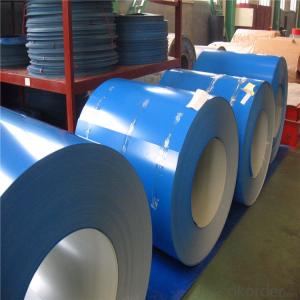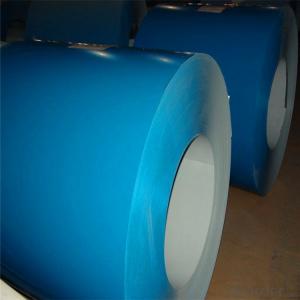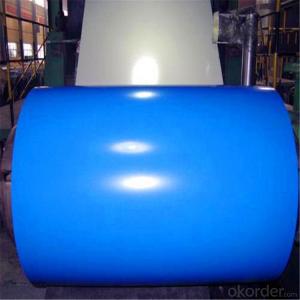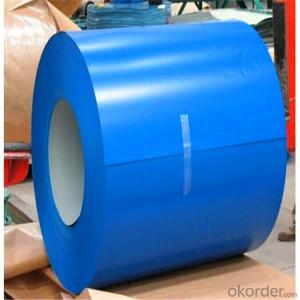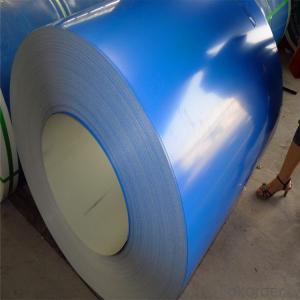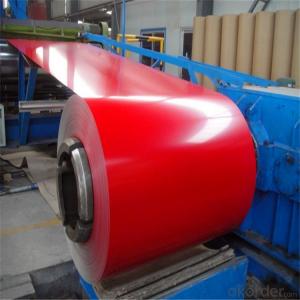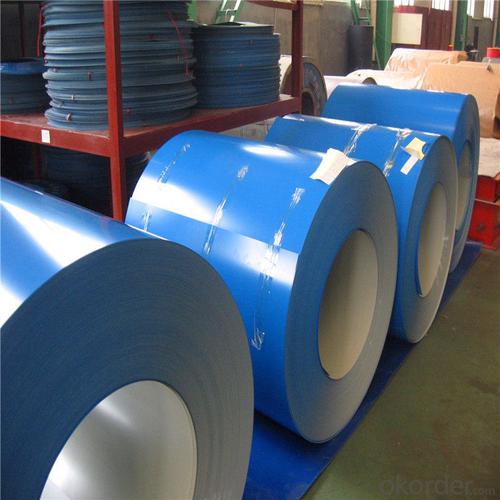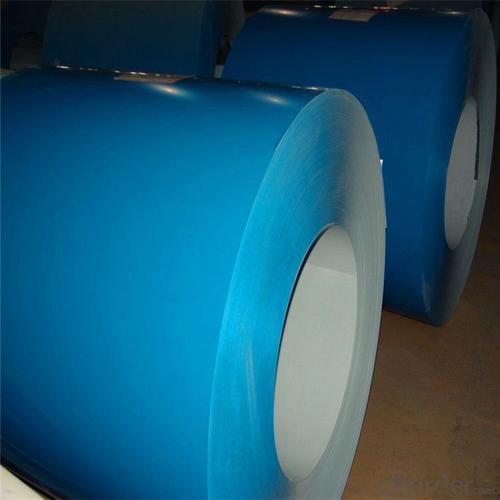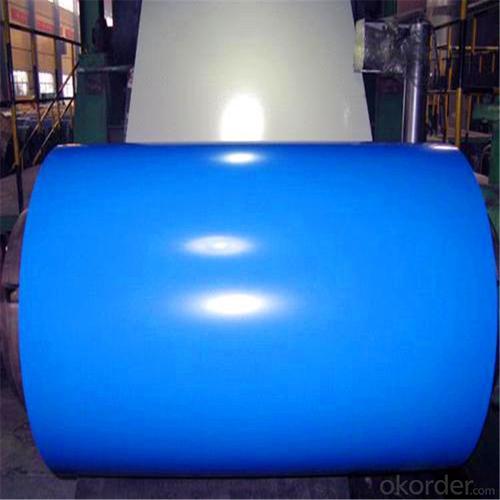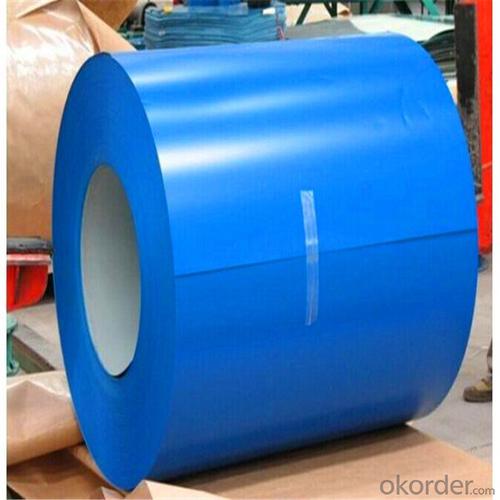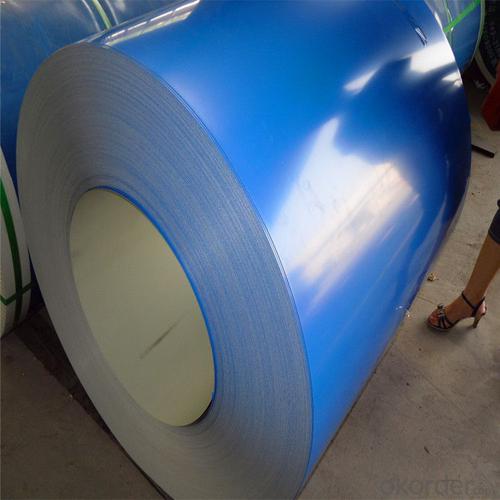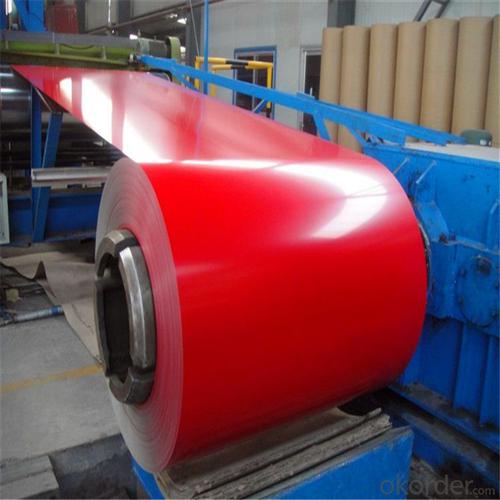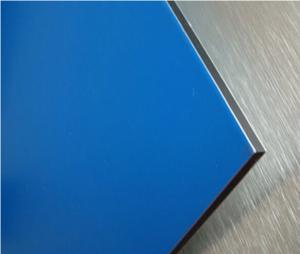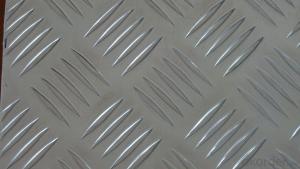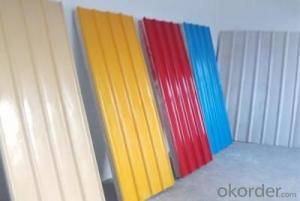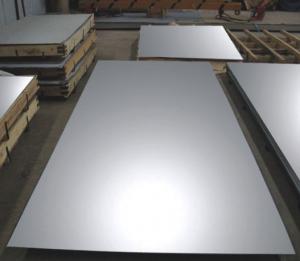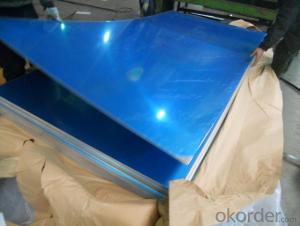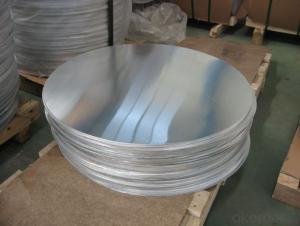0.4mm Thick PPGI Metal Sheet for Building
- Loading Port:
- Tianjin
- Payment Terms:
- TT or LC
- Min Order Qty:
- 25 m.t.
- Supply Capability:
- 5000 m.t./month
OKorder Service Pledge
OKorder Financial Service
You Might Also Like
Specification
0.4mm Thick PPGI Metal Sheet
Description of 0.4mm Thick PPGI Metal Sheet
Product | PPGI/PPGL |
Capacity | 5,000 tons/month |
Base material | Hot dipped galvanized steel |
Thickness | 0.2-2.0mm |
Width | 600-1250mm(according to your need) |
Coil Weight | 3-6tons |
Quality | SGCC, DX51D |
Color | RAL No. or customers samples’ color |
Zinc-coating | 30g/m2-180g/m2 |
Coil ID | 508mm/610mm |
Technique | Cold rolled—hot dipped galvanized—color coated |
Painting | Top painting:15~25μm |
Back painting: 6~10μm | |
Tolerance | Thickness: +/-0.02mm |
Width:+/-2mm | |
Shipment time | within 15-45 workdays |
Payment | T/T, L/C at sight |
Packing | Standard export packing |
The special order can be negotiated. | |
Application of 0.4mm Thick PPGI Metal Sheet
APPLICATION OF OUR PREPAINTED STEEL | ||||||||||
Construction | Outside | Workshop,agricultural warehouse,residential precast unit | ||||||||
corrugated roof,roller shutter door,rainwater drainage pipe,retailer booth | ||||||||||
Inside | Door,doorcase,light steel roof stucture,folding screen,elevator,stairway,ven gutter,Construction Wall | |||||||||
Electrical applicance | Refrigerator,washer,switch cabnet,instrument cabinet,air conditioning,micro-wave owen,bread maker | |||||||||
Fuiniture | Central heating slice,lampshade,chifforobe,desk,bed,locker,bookself | |||||||||
Carrying trade | Exterior decoration of auto and train,clapboard,container,isolation lairage,isolation board | |||||||||
Qthers | Writing panel,garbagecan,billboard,timekeeper,typewriter,instrument panel,weight sensor,photographic equipment | |||||||||
Products Show of 0.4mm Thick PPGI Metal Sheet

Product Advantages
1.With nearly 20 years experience in prepainted steel, accommodate different marketdemands. | ||||||||||||||
2.'Quality first, service first' is our business aim; 'The good faith get respect,cast quality market' is our Business philosophy . | ||||||||||||||
3.Having two series producttion line,with the abbual production capacity of 240000 tons. | ||||||||||||||
4.Exceed International ISO9001:2008&ISO14001:2004 quality and environmental standards | ||||||||||||||
5.Meet with ROHS standard |
Company Information
CNBM International Corporation is the most important trading platform of CNBM group.
Whith its advantages, CNBM International are mainly concentrate on Cement, Glass, Iron and Steel, Ceramics industries and devotes herself for supplying high qulity series of refractories as well as technical consultancies and logistics solutions.


F A Q
1, Your advantages?
professional products inquiry, products knowledge train (for agents), smooth goods delivery, excellent customer solution proposale
2, Test & Certificate?
SGS test is available, customer inspection before shipping is welcome, third party inspection is no problem
3, Factory or Trading Company?
CNBM is a trading company but we have so many protocol factories and CNBM works as a trading department of these factories. Also CNBM is the holding company of many factories.
4, Payment Terms?
30% TT as deposit and 70% before delivery.
Irrevocable L/C at sight.
5, Trading Terms?
EXW, FOB, CIF, FFR, CNF
6, After-sale Service?
CNBM provides the services and support you need for every step of our cooperation. We're the business partner you can trust.
For any problem, please kindly contact us at any your convenient time.
We'll reply you in our first priority within 24 hours.
- Q: How does special steel resist deformation under load?
- Special steel resists deformation under load due to its unique properties and composition. It is typically made with higher levels of alloying elements such as chromium, nickel, and molybdenum, which enhance its strength, hardness, and toughness. These alloying elements form strong bonds within the steel's crystal lattice structure, making it more resistant to deformation. Additionally, special steels often undergo heat treatment processes such as quenching and tempering, which further refine their microstructure and increase their ability to withstand loads without deforming. Overall, the combination of alloying elements and heat treatment techniques allows special steel to maintain its shape and structural integrity even under high-stress conditions.
- Q: What are the different grades and specifications of special steel?
- Special steel refers to a category of steel that is specifically designed to possess enhanced properties for specific applications. There are various grades and specifications of special steel available, each tailored to meet specific requirements. Some common grades include tool steel, stainless steel, high-speed steel, and alloy steel. These grades are further categorized based on their composition, strength, hardness, corrosion resistance, and other properties. Additionally, special steel specifications may vary depending on the industry or application, such as aerospace, automotive, construction, or oil and gas. Overall, the diverse range of grades and specifications in special steel allows for customized solutions to meet specific performance demands.
- Q: What are the properties of shock-resistant steel?
- Shock-resistant steel, also known as impact-resistant steel, possesses several properties that make it highly resistant to shock or impact. Firstly, it exhibits a high level of toughness, meaning it can absorb a significant amount of energy without fracturing or breaking. This toughness is often achieved through the use of alloying elements, such as manganese, nickel, or chromium, which enhance the steel's ability to absorb and distribute the energy of an impact. Additionally, shock-resistant steel has a high tensile strength, allowing it to resist deformation under high-stress conditions. This property enables the steel to maintain its structural integrity and prevent permanent damage when subjected to sudden or intense impacts. Furthermore, shock-resistant steel often displays excellent ductility, enabling it to undergo plastic deformation without fracturing. This ductility allows the steel to absorb and dissipate energy, ensuring that it remains intact even in high-impact scenarios. Overall, the properties of shock-resistant steel make it a reliable and durable material for applications requiring resistance to sudden impacts, such as construction equipment, armored vehicles, and machinery components.
- Q: How does special steel contribute to national security?
- National security is significantly enhanced by special steel, which serves various purposes. Firstly, it is extensively utilized in the production of military equipment and weapons. Tanks, armored vehicles, submarines, and aircraft carriers require special steel due to its exceptional strength, resilience, and resistance to corrosion. Incorporating special steel into military applications ensures the durability and reliability of these vital defense systems, ultimately strengthening national security. Secondly, special steel plays a pivotal role in the construction of critical infrastructure. Bridges, tunnels, and buildings, which are essential for a nation's functioning and security, rely on special steel. Its unparalleled strength and ability to withstand extreme conditions make it a crucial material for structures that must endure natural disasters, terrorist attacks, or other security threats. By incorporating special steel into infrastructure projects, a nation can fortify its security and safeguard its citizens. Additionally, special steel is of utmost importance in the energy sector, particularly within nuclear power plants. Special steel alloys are employed in the construction of reactor vessels and other components that encounter high temperatures and pressures. The utilization of special steel ensures the integrity and safety of these critical facilities, mitigating the risk of potential nuclear accidents that could pose significant threats to national security. Lastly, special steel contributes to national security by supporting the defense industry and fostering technological advancements. Research and development in special steel alloys often lead to breakthroughs in material engineering, which can have broader applications beyond defense. These advancements stimulate innovation in sectors such as aerospace, automotive, and energy, thereby augmenting a nation's overall technological capabilities and economic competitiveness. In conclusion, special steel's contribution to national security is multifaceted. Its incorporation in military equipment, critical infrastructure, nuclear power plants, and technological advancements all play a pivotal role in safeguarding a nation's interests, protecting its citizens, and maintaining its strategic advantage in an increasingly turbulent world.
- Q: What are the different magnetic grades of special steel?
- There are several different magnetic grades of special steel that are commonly used in various applications. Some of the most common magnetic grades include: 1. Soft Magnetic Materials: These grades of special steel are designed to have high magnetic permeability and low coercivity. They are used in applications where a high magnetic induction is required, such as in transformers, electric motors, and magnetic cores for electrical devices. 2. Martensitic Stainless Steels: These grades of special steel have a high magnetic permeability and are magnetic in their hardened state. They are commonly used in applications such as cutlery, tools, and certain automotive components. 3. Ferritic Stainless Steels: These grades of special steel have a lower magnetic permeability compared to martensitic stainless steels, but they are still magnetic. They are commonly used in applications such as automotive exhaust systems, decorative trim, and appliances. 4. Duplex Stainless Steels: These grades of special steel possess a mixed microstructure of austenite and ferrite, resulting in a magnetic response. They are known for their high corrosion resistance and are used in applications where both strength and corrosion resistance are required, such as in chemical processing equipment and offshore oil and gas platforms. 5. Austenitic Stainless Steels: These grades of special steel are non-magnetic in their annealed state. However, they can exhibit slight magnetism when cold worked or if they contain certain alloying elements. Austenitic stainless steels are widely used in various applications, such as in food processing equipment, architectural structures, and medical devices. It's important to note that the presence or absence of magnetism in special steel grades can vary depending on factors such as composition, heat treatment, and processing. Therefore, it is crucial to consider the specific requirements of a particular application when selecting the appropriate magnetic grade of special steel.
- Q: What are the different non-destructive testing methods used for special steel?
- Some different non-destructive testing methods used for special steel include ultrasonic testing, magnetic particle testing, liquid penetrant testing, radiographic testing, and eddy current testing. These methods help to detect and evaluate any defects or abnormalities in the steel without causing any damage to the material.
- Q: How does special steel contribute to improving product resistance to environmental factors?
- Special steel contributes to improving product resistance to environmental factors in several ways. Firstly, special steel alloys are specifically designed to have enhanced corrosion resistance, which helps protect the product from rusting or deteriorating when exposed to moisture, chemicals, or harsh weather conditions. Additionally, special steel can have increased strength and hardness, making the product more durable and able to withstand mechanical stress or impacts caused by environmental factors. Moreover, some special steel alloys have excellent heat resistance, enabling the product to maintain its structural integrity and performance even at high temperatures. Overall, the unique properties of special steel make it an ideal material choice for enhancing product resistance to various environmental factors.
- Q: How does special steel contribute to the agriculture aftermarket industry?
- The agriculture aftermarket industry relies heavily on special steel, which plays a vital role in enhancing productivity and efficiency in farming operations through the provision of high-performance components and equipment. Special steel, also known as alloy steel, is specifically engineered to possess properties such as strength, durability, corrosion resistance, and heat resistance, making it well-suited for various agricultural applications. One of the major contributions of special steel to the agriculture aftermarket industry is the manufacturing of machinery parts that are durable and reliable. These parts, including plowshares, blades, and tines, face harsh conditions such as intense wear, impact, and exposure to corrosive substances. However, special steel components can endure these challenges and offer a longer service life, resulting in reduced downtime and maintenance costs for farmers. Moreover, special steel is utilized in the production of agricultural equipment such as tractors, harvesters, and sprayers. These machines require materials that are both strong and lightweight to ensure optimal performance and fuel efficiency. The use of special steel grades provides the necessary strength while keeping the equipment's weight low, enabling farmers to cover larger areas and increase their productivity. Additionally, special steel alloys are employed in the manufacturing of precision tools used in precise farming techniques, such as cutting blades and drill bits. These tools allow farmers to carry out tasks with high accuracy, such as soil sampling, seeding, and crop monitoring. The durability and sharpness of special steel tools enhance the precision and effectiveness of these operations, leading to improved crop yields and efficient use of resources. Furthermore, special steel is also utilized in the construction of infrastructure related to the agriculture aftermarket industry. Steel beams and columns, for example, are used in the fabrication of storage facilities, barns, and grain silos, providing structural strength and stability. This infrastructure enables efficient storage, handling, and transportation of agricultural products, contributing to the overall efficiency of the industry. In conclusion, special steel is an indispensable component of the agriculture aftermarket industry as it contributes to the production of durable machinery parts, lightweight equipment, precision tools, and robust infrastructure. By offering enhanced strength, durability, and corrosion resistance, special steel helps farmers improve productivity, reduce downtime and maintenance costs, and achieve better crop yields.
- Q: Is special steel suitable for manufacturing firearms?
- Yes, special steel is suitable for manufacturing firearms. Special steel, also known as alloy steel, offers excellent strength, durability, and resistance to wear and tear, making it an ideal material for firearm production. It provides the necessary mechanical properties required for firearm components, ensuring reliable performance and long-lasting functionality. Additionally, special steel can be heat-treated to enhance its hardness and toughness, further enhancing its suitability for manufacturing firearms.
- Q: What are the different methods of improving the toughness of special steel?
- There are several methods that can be employed to improve the toughness of special steel. One common method is through the use of alloying elements. By adding certain elements such as nickel, chromium, or manganese to the steel composition, the toughness can be enhanced. These alloying elements help in increasing the strength and resistance to cracking or fracturing. Another technique is heat treatment. Different heat treatment processes like quenching and tempering can be applied to special steel to modify its microstructure and enhance its toughness. Quenching involves rapidly cooling the steel from a high temperature, which creates a hardened structure, while tempering involves reheating the quenched steel to a specific temperature and then slowly cooling it. Furthermore, the use of grain refinement techniques can also improve the toughness of special steel. By controlling the size and distribution of grains within the steel, it is possible to increase its resistance to fracture. Techniques like grain size control through recrystallization and severe plastic deformation can be utilized to refine the grain structure and improve toughness. Additionally, controlling the impurity content in the steel can contribute to its toughness. Impurities like sulfur and phosphorus can lead to brittleness, so minimizing their presence through refining and purification processes can enhance the steel's toughness. Moreover, surface treatment methods such as shot peening or surface hardening can be employed to improve the toughness of special steel. Shot peening involves bombarding the steel surface with small spherical particles to induce compressive stress, which helps in resisting crack propagation. Surface hardening techniques like carburizing or nitriding can also be used to create a hardened layer on the surface, improving its toughness. In conclusion, the different methods of improving the toughness of special steel include alloying, heat treatment, grain refinement, impurity control, and surface treatment. These techniques can be combined or used individually to enhance the steel's properties and make it more resistant to cracking or fracturing.
Send your message to us
0.4mm Thick PPGI Metal Sheet for Building
- Loading Port:
- Tianjin
- Payment Terms:
- TT or LC
- Min Order Qty:
- 25 m.t.
- Supply Capability:
- 5000 m.t./month
OKorder Service Pledge
OKorder Financial Service
Similar products
Hot products
Hot Searches
Related keywords
